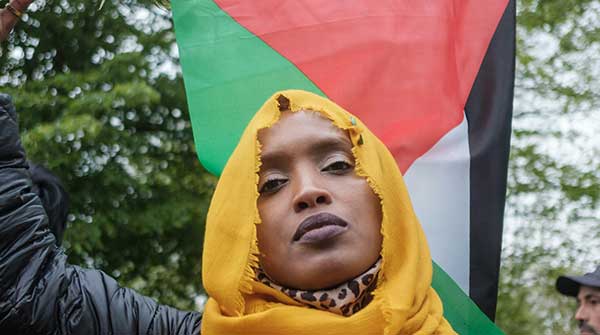How its history of oppression has shaped its empathy toward Palestine
 The Irish Seanad (Senate) recently voted unanimously to ban the use of Irish airspace to deliver weapons to Israel. While this bill still needs to be passed in Ireland’s elected parliament before becoming law, it reflects the consistent solidarity between the people of Palestine and the people of Ireland. In many ways, as the assault on Gaza has progressed since last October, Ireland has shown itself again and again to be the conscience of Western Europe.
The Irish Seanad (Senate) recently voted unanimously to ban the use of Irish airspace to deliver weapons to Israel. While this bill still needs to be passed in Ireland’s elected parliament before becoming law, it reflects the consistent solidarity between the people of Palestine and the people of Ireland. In many ways, as the assault on Gaza has progressed since last October, Ireland has shown itself again and again to be the conscience of Western Europe.
The ruling coalition in the Irish Dail (Parliament) has largely toed the line of the European Union, but the opposition Sinn Fein party has passionately spoken out for an end to the slaughter in Gaza. Irish President Michael D. Higgins has also made numerous appeals to the international community for the respect of Palestinian human rights.
Ireland’s support for Palestinians goes back decades. In 1980, Ireland became the first European nation to endorse the establishment of a Palestinian state, and it has since taken steps to recognize Palestinian statehood. This goal has yet to be accomplished, but Ireland is far ahead of its neighbours.
Why is Ireland so different? Primarily because, unlike the rest of Western Europe, it was never a colonizing country. In fact, it is quite the opposite. The English exploited Ireland for centuries, using tactics that are very similar to those we now see being played out in Gaza. While older history books claim, for example, that there was a “potato famine” in the mid-19th century in Ireland, modern historians have begun to question the degree of intent and have asked whether or not it was ethnic cleansing or even genocide. Food was exported to Britain while the Irish were starving, and the English even attempted to turn away aid coming from the Ottoman Empire.
The result was the depopulation of Ireland through starvation and mass exodus. This allowed the British to confiscate more land in their colony. It is, therefore, not difficult for the Irish to recognize the colonial methodologies being used right now in Gaza.
Irish empathy toward the people of Palestine is demonstrated in many ways. In a passionate speech at the European Union Parliament, Irish representative Clare Daly referred to the American president as “Butcher Biden” and disowned him as a person of Irish descent. Cork writer Tadhg Hickey has created the most poignant and honest comedy sketches on Israeli and Palestinian relations. Playing multiple roles in his videos, Hickey points out, for example, the irony and hypocrisy of Western powers supporting Ukraine unconditionally while condemning Palestinian appeals for self-preservation.
Perhaps the most beautiful tribute to the people of Palestine is a mural recently painted on a wall constructed by Great Britain during “The Troubles” in Belfast. This period marked the use of colonial force to stamp out the Irish Republican Army (IRA) in much the same way that Israel claims that it wants to destroy Hamas. It was, of course, an impossible feat. One cannot use weapons to destroy an idea. Peace came, however, when adversaries engaged in real dialogue and condemned the use of violence by all sides in the conflict.
Ireland demonstrates that support for Palestine has nothing to do with a person’s religion or the colour of their skin. It has a great deal to do, however, with one’s attitude toward colonialism and respect for human rights. The fact that there is a country in Western Europe that hears and understands the cries of Palestinians means a great deal to a population under siege.
It is becoming more and more difficult for any person with a functioning conscience to maintain moral consistency and turn away from the suffering unfolding in Gaza.
Thank you, Ireland, for your example and your moral clarity.
Gerry Chidiac specializes in languages and genocide studies and works with at-risk students. He received an award from the Vancouver Holocaust Education Centre for excellence in teaching about the Holocaust.
For interview requests, click here.
The opinions expressed by our columnists and contributors are theirs alone and do not inherently or expressly reflect the views of our publication.
© Troy Media
Troy Media is an editorial content provider to media outlets and its own hosted community news outlets across Canada.


Thank you, Gerry!